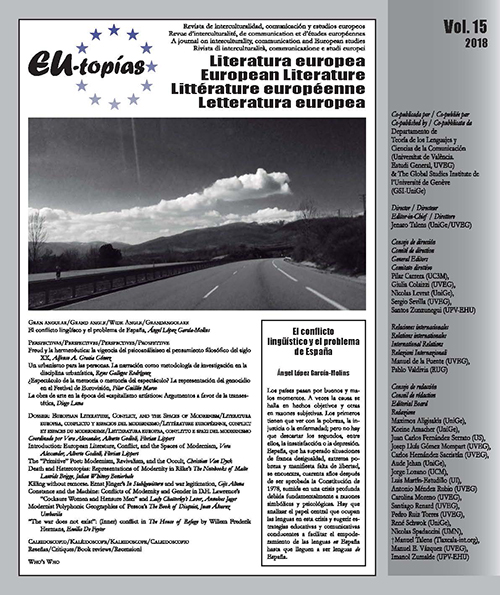Spectacle de mémoire ou mémoire du spectacle?
DOI :
https://doi.org/10.7203/eutopias.0.18574Mots-clés :
Spectacle, genocide, Crimea, Festival d’Eurovisio Résumé
Résumé
Le Festival d’Eurovision est devenu, surtout ces dernières années, un espace où les Etats participants ont présenté des performances musicales liées aux causes de la justice sociale, parmi lesquelles la question de la mémoire sur le traumatisme de l’expulsion et nettoyage ethnique dans le passé européen. Dans le cas de l’édition de 2016, la chanson gagnante sur la déportation de la population tatare de Crimée pendant la Seconde Guerre mondiale a ouvert le débat sur les implications politiques de ce festival. A travers l’analyse des paroles et la mise en scène de la chanson “1944” nous pourrons voir le discours politique présent dans celui-ci et nous essaierons de clarifier si le spectacle peut devenir un espace où encourager le débat sur la mémoire, ou Au contraire, la représentation du traumatisme du génocide dans le spectacle se limite à rendre spectaculaire la tragédie.
 Téléchargements
Téléchargements
 Références
Références
Anttonen, Pertti J. (1996), “Introduction: Tradition and Political Identity”. En Pertti J. Anttonen (ed), Making Europe in Nordic Contexts, NIF Publications, Turku, pp. 7-40.
Baker, Catherine (2008), “Wild Dances and Dying Wolves: Simulation, Essencialization, and Nacional Identity at the Eurovision Song Contest”, Popular Communication: The International Journal of Media and Culture, 6 (3), pp. 173-189.
Baudrillard, Jean (1978), Cultura y simulacro, Barcelona: Kairós.
Baudrillard, Jean (1994), Simulacra and simulation, Ann Arbor, University of Michigan Press.
Bolin, Göran (2006), “Visions of Europe: Cultural Technologies of Nation-States”, International Journal of Cultural Studies, 9 (2), pp. 189-206.
Buhari gulmez, Didem (2016), “Religion and Nation-Building in Crimea”, En Rico Isaacs y Abel Polese (eds.), Nation-Building and Identity in the Post-Soviet Space. New Tools and Approaches, London, Routledge, pp. 65-82.
Danero iglesias, Julien (2015), “Eurovision Song Contest and identity crisis in Moldova”, Nationalities Papers: The Journal of Nationalism and Ethnicity, 43 (2), pp. 233-247.
Dayan, Daniel y Katz, Elihu (1992), Media events, the live broadcasting of history, Cambridge, Harvard University Press.
Debord, Guy (1976), La sociedad del espectáculo, Madrid: Castellote.
Derderian, Ani (2011), “Characteristics of Armenian Folk Tales”, International Journal of Business and Social Science, 24 (2), pp. 74-82.
Ismayilov, Murad (2012), “State, Identity and the Politics of Music: Eurovision and Nation-Building in Azerbaijan”, Nationalities Papers, 40 (6): 833-851.
Jordan, Paul (2014), The Modern Fairy Tale: Nation Branding, National Identity and the Eurovision Song Contest in Estonia, Tartu: University of Tartu Press.
Legg ewie, Claus (2008), “A tour of the battleground: The seven circles of pan-European memory”, Social Research, 75(1), pp. 217-234.
Marković, Aleksandra (2013), Sounding stereotypes: Construction of place and reproduction of metaphors in the music of Goran Bregović. University of Amsterdam.
Naroditskaya, Inna (2002), “The sound of traditional mugham”, En Inna Naroditskaya, Song from the Land of Fire: Continuity and Change in Azerbaijanian Mugham, New York, Routledge, pp. 53-90.
Raykoff, Ivan (2007), “Camping on the borders of Europe”. En Ivan Raykoff and Robert Deam Tobin (eds.), A song for Europe. Popular music and politics in the Eurovision Song Contest, Hampshire, Ashgate, pp. 1-13.
Téléchargements
Publiée
Comment citer
-
Résumé227
-
PDF (Español)80
Numéro
Rubrique
Licence
![]()
Tous les contenus publiés dans EU-topías. Revista de Interculturalidad, Comunicación y Estudios Europeos est sous licence Creative Commons Paternité-Pas d'Utilisation Commerciale-Partage des Conditions Initiales à l'Identique 4.0. Le texte complet de la licence peut être trouvé à http://creativecommons.org/licenses/by-nc-sa/4.0
Ils peuvent être copiés, utilisés, diffusés, transmis et affichés publiquement, à condition que:
- L'auteur et la source originale de la publication sont cités (magazine, éditeur et URL de l'œuvre).
- Ils ne sont pas utilisés à des fins commerciales.
- L'existence et les spécifications de cette licence d'utilisation sont mentionnées



